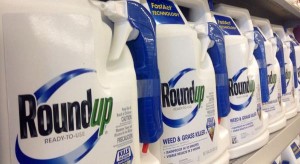EU Parlament vor neuer Zulassung Glyphosat. Wohl Unterstützung für Verbot privater und öffentlicher Nutzung.
Das Europäische Parlament hat einer erneuten Zulassung des umstrittenen Pestizids Glyphosat für maximal 7 Jahre zugestimmt. Das ist kürzer als die von der Europäischen Kommission vorgeschlagenen 15 Jahre. Die Partei für die Tiere setzte sich für ein vollständiges Verbot von Glyphosat ein. “Enttäuschend, dass auch das Europäische Parlament den Gewinn von Multinationalen wie Monsanto für wichtiger hält, als unsere Umwelt und die Gesundheit von Menschen und Tieren,” so Europaparlamentarierin Anja Hazekamp.

“Dieses Gift ist überall und muss vom Markt genommen werden, jetzt wo die Sicherheit von Mensch und Tier nicht garantiert werden kann,” stellt Anja Hazekamp klar. Vorschläge der Partei für die Tiere und der Grünen (GroenLinks), private Nutzung und Nutzung in öffentlichen Parkanlagen und Spielplätzen zu verbieten, haben wohl Zustimmung im Europäischen Parlament erhalten.
Glyphosat ist das meistverkaufte Pestizid der Welt. Das Gift tötet Unkraut in Gärten und wird großflächig in der Landwirtschaft eingesetzt. Die Weltgesundheitsorganisation warnte letztes Jahr, dass das Gift wahrscheinlich Krebserregend ist. Möglicherweise hat das Gift außerdem eine hormonverstörende Wirkung. Der Produzent Monsanto, sowie die europäische Politik, ist allerdings der Ansicht, dass das Pestizid sicher zu verwenden ist. Darum hatte die Europäische Kommission vorgeschlagen, Glyphosat erneut für den maximalen Zeitraum von 15 Jahren zuzulassen.
“Die weitverbreitete Verwendung und die krebserregende Wirkung von Glyphosat, bilden eine gefährliche Kombination. Das Gift ist in Flüssen, im Grundwasser und unseren Lebensmitteln. Studien zeigen, dass die Hälfte aller Menschen in Europa Spuren von Glyphosat in seinem oder ihrem Körper haben. Viele Menschen sind darum sehr besorgt, ganze zwei Drittel der Europäer wollen ein Verbot von Glyphosat,” so Anja Hazekamp.
Die endgültige Entscheidung über Glyphosat liegt bei den 28 Mitgliedstaaten der Europäischen Union. Sie stimmen Mitte Mai über die erneute Zulassung dieses Krebserregers ab. Frankreich, Schweden, Italien und die Niederlande haben sich bislang gegen die Erneuerung der Glyphosatzulassung ausgesprochen. Aber Staatssekretär Van Dam ließ vor kurzem in einem Brief an die zweite Kammer des Parlaments wissen, unter bestimmten Voraussetzungen, doch einer neuen Zulassung des Pestizids zustimmen zu wollen.
The European Parliament has approved of the readmission of the controversial pesticide glyphosate for maximum seven years. That is shorter than the admission for fifteen years as was proposed by the European Commission. The Party for the Animals called for a total ban of glyphosate. “It is highly disappointing that the European Parliament finds the profits of multinationals such as Monsanto more important than our environment and the health of people and animals,” said MEP Anja Hazekamp.

“This pesticide is hard to avoid and must be taken off the market since the safety of people and animals cannot be guaranteed,” said Hazekamp. The proposals of the Party for the Animals and Green Left to ban private use and the use in public parks and playgrounds were supported in the European Parliament.
Glyphosate is the most sold pesticide in the world. The pesticide kills weed in gardens and is used on a large scale in agriculture. Last year, the World Health Organisation warned that the pesticide is most likely carcinogenic. Additionally, the pesticide may possibly be endocrine disruptors. But its producer Monsanto and the daily European government state that the pesticide is safe for use. The European Commission therefore made a proposal for the readmission of glyphosate for the maximum period of fifteen years.
“The widespread use and the carcinogenic effect of glyphosate are a dangerous combination. This pesticide is found in rivers, in ground water and in our food. Research has proved that half of all people in Europe have levels of glyphosate in their body. Many people are seriously concerned about it, as much as two-thirds of all Europeans want glyphosate to be banned,” according to Hazekamp.
The definitive decision about glyphosate lies with the 28 Member States of the European Union. They will vote on readmission of this cargogenic product in mid-May. France, Sweden, Italy and the Netherlands have objected to renewing the glyphosate admission until now. But State Secretary Van Dam recently informed the Lower House by letter that he wishes to agree to the readmission of the pesticide under certain conditions.